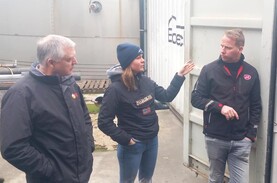Agricultural ministers from across the 27 EU member states struck a compromise deal on the next CAP during the small hours of Wednesday morning.
With an agreement now in place, German Federal Minister of Food, Agriculture and Consumer Protection, Julia Klöckner has a mandate to enter final trilogue negotiations with the European Parliament.
Farmers will be hugely disappointed
Commenting on the agreement, ICMSA president Pat McCormack said: “Farmers will be hugely disappointed given that we are going to be asked to do more with less, while nothing has been put in place to ensure sustainable prices.
“The bottom line here is that every farmer will see a reduction of at least 20% in their Pillar I BPS or greening payment and will only get this back if they join an eco-scheme.”
Slowing transition
The ICMSA has said that instead of looking at the contributions other links in the food supply chain could make, the ministers are taking the option of making more Pillar I payments to farmers dependent on environmental regulation.
McCormack continued: “The tactic of going back and loading more environmental burden on farmers for less direct payment is wrong and will eventually slow to a stop the transition that we all know has to be made.”
Move forward
In contrast, ICOS has welcomed the agreement stating that it sets out a higher level of environmental ambition for the future CAP and paves the way for national flexibility in programme design and management.
ICOS president Jerry Long said: “While we will be closely following the further votes, we at least know that we will be able to move forward in the process and can continue to build on the hard work which has already been done.
“Farmers and the overall agri-food industry need certainty in order to strategically plan and make decisions on investments. This is a very critical time for the sector, which continues to face significant market disruption as a result of COVID-19 and Brexit.”
Young farmers
CEJA has said it regrets that Ministers did not raise their ambitions on the generational renewal objective.
Europe’s young farmers count on EU decision-makers to ensure that generational renewal can actually take place
President Jannes Maes said: “With no real budgetary support these instruments fail in achieving their core objective of attracting and sustaining young farmers.
“Europe’s young farmers count on EU decision-makers to ensure that generational renewal can actually take place. They are committed to deliver food security to EU citizens for the upcoming decades while striving for a more sustainable sector.”
The president said that by not taking into account young farmers’ concerns, Ministers missed a chance to efficiently tackle the environmental challenge and guarantee an ambitious generational renewal for the sector.
Read more
EU agricultural ministers strike late-night CAP deal
European Parliament votes down motion to reject CAP proposal
Agricultural ministers from across the 27 EU member states struck a compromise deal on the next CAP during the small hours of Wednesday morning.
With an agreement now in place, German Federal Minister of Food, Agriculture and Consumer Protection, Julia Klöckner has a mandate to enter final trilogue negotiations with the European Parliament.
Farmers will be hugely disappointed
Commenting on the agreement, ICMSA president Pat McCormack said: “Farmers will be hugely disappointed given that we are going to be asked to do more with less, while nothing has been put in place to ensure sustainable prices.
“The bottom line here is that every farmer will see a reduction of at least 20% in their Pillar I BPS or greening payment and will only get this back if they join an eco-scheme.”
Slowing transition
The ICMSA has said that instead of looking at the contributions other links in the food supply chain could make, the ministers are taking the option of making more Pillar I payments to farmers dependent on environmental regulation.
McCormack continued: “The tactic of going back and loading more environmental burden on farmers for less direct payment is wrong and will eventually slow to a stop the transition that we all know has to be made.”
Move forward
In contrast, ICOS has welcomed the agreement stating that it sets out a higher level of environmental ambition for the future CAP and paves the way for national flexibility in programme design and management.
ICOS president Jerry Long said: “While we will be closely following the further votes, we at least know that we will be able to move forward in the process and can continue to build on the hard work which has already been done.
“Farmers and the overall agri-food industry need certainty in order to strategically plan and make decisions on investments. This is a very critical time for the sector, which continues to face significant market disruption as a result of COVID-19 and Brexit.”
Young farmers
CEJA has said it regrets that Ministers did not raise their ambitions on the generational renewal objective.
Europe’s young farmers count on EU decision-makers to ensure that generational renewal can actually take place
President Jannes Maes said: “With no real budgetary support these instruments fail in achieving their core objective of attracting and sustaining young farmers.
“Europe’s young farmers count on EU decision-makers to ensure that generational renewal can actually take place. They are committed to deliver food security to EU citizens for the upcoming decades while striving for a more sustainable sector.”
The president said that by not taking into account young farmers’ concerns, Ministers missed a chance to efficiently tackle the environmental challenge and guarantee an ambitious generational renewal for the sector.
Read more
EU agricultural ministers strike late-night CAP deal
European Parliament votes down motion to reject CAP proposal






 This is a subscriber-only article
This is a subscriber-only article










SHARING OPTIONS: